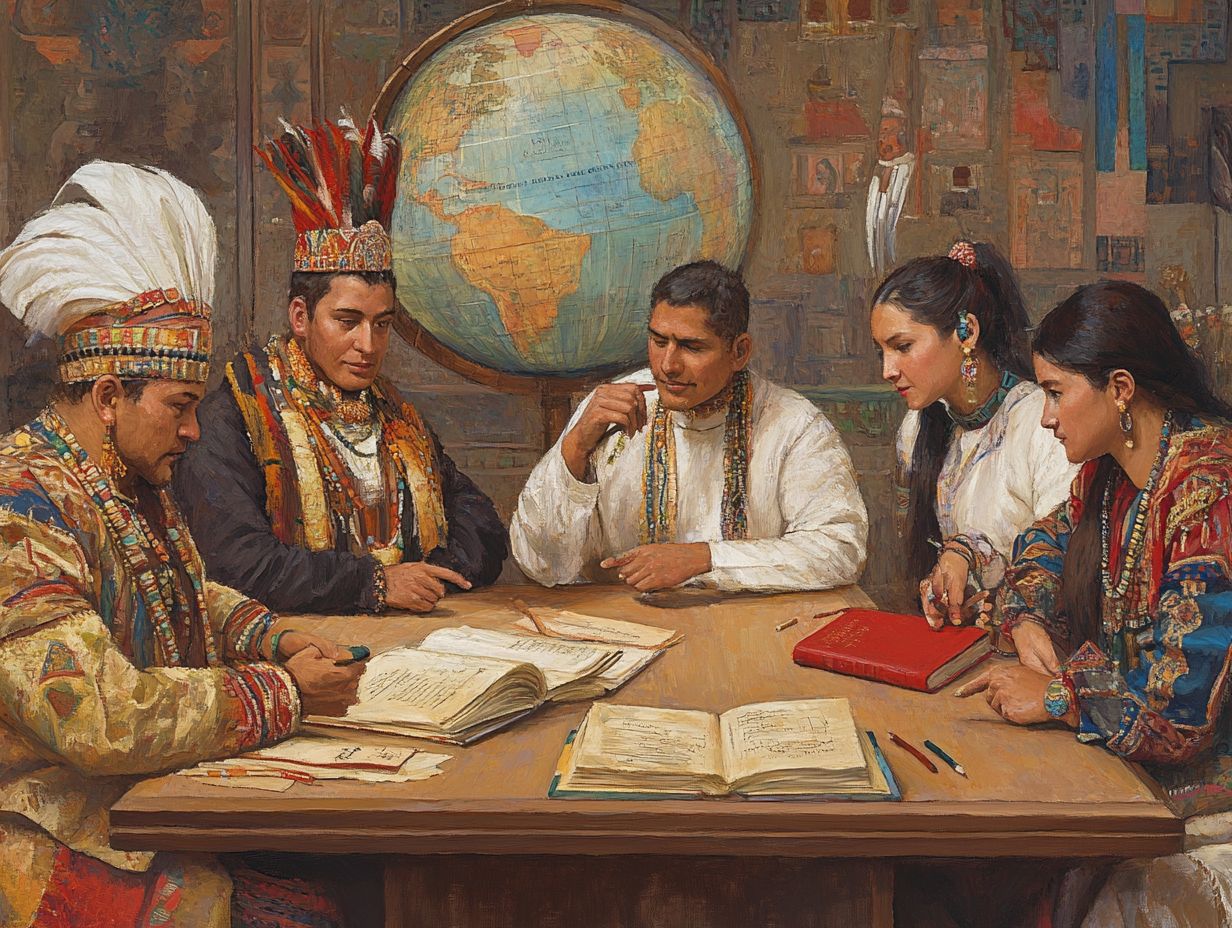7 tips for balancing language and culture
Navigating the intricate dance of language and culture has the power to shape your life in profound ways, both personally and professionally. Jump in now to discover incredible opportunities that could change your life!
This article offers seven essential tips designed to help you achieve a harmonious balance. Understanding the significance of cultural immersion, respecting differences, and steering clear of stereotypes will empower you to cultivate cultural sensitivity and embrace diversity.
Whether you aim to elevate your career or enrich your personal experiences, mastering this balance can open a world of opportunities. Dive in to uncover the possibilities that await!
Contents
- Key Takeaways:
- 1. Understand the Importance of Language and Culture Balance
- 2. Learn the Language of the Culture You Are Immersed In
- 3. Immerse Yourself in the Culture
- 4. Be Respectful of Cultural Differences
- 5. Avoid Stereotyping and Generalizations
- 6. Seek Out Cultural Experiences and Events
- 7. Continuously Educate Yourself on Language and Culture
- How Can Language and Culture Balance Impact Your Personal and Professional Life?
- What Are the Common Challenges of Balancing Language and Culture?
- How Can One Develop Cultural Sensitivity?
- What Are the Benefits of Being Bilingual or Multilingual?
- How Can Businesses Benefit from Embracing Language and Culture Balance?
- What Are Some Strategies for Maintaining Language and Culture Balance in a Diverse Society?
- Frequently Asked Questions
- What are the 7 tips for balancing language and culture?
- How can I effectively immerse myself in a new culture?
- Is it important to learn the language when trying to balance culture?
- How can I be respectful of cultural norms?
- What is the significance of active listening in balancing language and culture?
- How can I embrace mistakes and learn from them?
Key Takeaways:

Understanding the balance between language and culture is crucial for communication and relationships. To enhance your skills, consider following 7 tips for effective language learning in groups as you learn the language of the culture you are immersed in to better understand and connect with others. Immerse yourself in the culture to gain a deeper understanding and appreciation for its customs and traditions.
1. Understand the Importance of Language and Culture Balance
In today s interconnected world, grasping the delicate balance between language and culture is vital for helping people understand each other better. Embracing the ability to understand and respect different cultures enables you to navigate differences and sidestep biases that could disrupt workplace dynamics.
This balance elevates performance and champions equity and inclusion. It s essential for both leaders and team members to recognize the significance of cultural sensitivity in cultivating a supportive work environment.
By understanding various cultural heritages and adapting to diverse expectations, you can enhance team-building efforts and social interactions. This ultimately boosts productivity and mental well-being.
When you appreciate the diverse communication styles and attitudes shaped by different cultural backgrounds, you re less likely to misinterpret intentions. This minimizes conflicts.
Effective leadership becomes pivotal in nurturing this awareness by promoting open dialogue and offering training focused on cultural competence. As management fosters an inclusive atmosphere, team members often feel enabled, leading to heightened collaboration and engagement.
Such an environment enhances team dynamics and improves overall organizational performance. Diverse perspectives can ignite creativity and innovation. Ultimately, focusing on cultural and linguistic balance transforms workplaces into thriving spaces for all employees.
2. Learn the Language of the Culture You Are Immersed In
Learning the language of the culture you re immersed in can profoundly elevate your ability to connect and communicate effectively within that community. This fosters deeper understanding and collaboration.
When you invest time and effort into mastering a language, it paves the way for clearer exchanges and showcases your respect for the values and nuances of that culture.
For instance, as a business professional fluent in the local language, you can navigate negotiations with finesse. This builds trust and rapport with clients and colleagues along the way.
In social settings, being able to converse in the native tongue can lead to more meaningful friendships. Shared language often nurtures shared experiences.
By bridging language barriers, you create inclusive environments that celebrate diversity. This ultimately enriches both your personal and professional relationships.
3. Immerse Yourself in the Culture
Immersing yourself in the culture you wish to understand opens doors to authentic experiences and relationships. Getting involved truly enriches your understanding and appreciation of cultural differences.
Participating in local celebrations, festivals, and team-building activities significantly enriches your journey. By engaging directly with traditions and customs, you gain insights that textbooks often overlook, bridging the gap between theory and real-world understanding.
This hands-on involvement cultivates deeper connections with community members and nurtures empathy and respect for diverse perspectives. These experiences are powerful tools for breaking down stereotypes and biases.
Ultimately, cultural immersion opens exciting doors for meaningful conversations and teamwork, which are essential for thriving in today s interconnected society. Start your journey today by diving into local events!
4. Be Respectful of Cultural Differences
Respecting cultural differences is vital. It creates a workplace where everyone feels valued and included.
When respect is woven into the very fabric of workplace culture, it builds trust among colleagues. This trust paves the way for open communication and seamless collaboration.
This kind of atmosphere uplifts morale and boosts productivity. You and your coworkers become more inclined to share ideas freely and support one another.
To build respect, try these strategies:
- Active listening
- Seeking feedback
- Celebrating diverse cultural events
These practices show genuine cultural sensitivity. Holding team members accountable during decision-making processes ensures that every voice is heard, reinforcing the invaluable contributions each individual brings to the table.
5. Avoid Stereotyping and Generalizations

Avoiding stereotypes and generalizations is essential for you to create a welcoming space where everyone is valued for who they are.
When you allow bias to dictate your team dynamics, collaboration suffers. Individuals may feel alienated or undervalued, leading to diminished morale and productivity.
You should engage in self-awareness and reflection to counteract these effects. Question your own assumptions and actively seek out diverse perspectives. Engaging in open dialogues can help dismantle stereotypes. By sharing personal experiences, you foster mutual understanding.
Additionally, implementing training programs focused on cultural competence can create a more cohesive unit. This not only encourages empathy and collaboration across various backgrounds but also enriches the overall workplace culture, enhancing teamwork along the way.
6. Seek Out Cultural Experiences and Events
Seek out cultural experiences to deepen your understanding of different traditions.
By immersing yourself in festivals, workshops, art exhibitions, and local performances, you dive into the vibrant tapestry of cultural expressions that thrive within your community.
These encounters broaden your perspective and offer great opportunities for personal growth. You learn new skills and appreciate a variety of viewpoints.
Engaging in these events allows you to connect with like-minded individuals, fostering a supportive network that encourages collaboration and ongoing dialogue.
These experiences inspire a strong sense of belonging, enabling you to actively contribute to your community and celebrate our shared humanity.
7. Continuously Educate Yourself on Language and Culture
Continuously educating yourself on language and culture equips you with essential tools to navigate an increasingly complex and diverse world, enabling a deeper understanding and adaptability to various cultural contexts.
By engaging in courses, attending workshops, and participating in cultural exchanges, you can enrich your awareness of different perspectives and practices. This ongoing journey of learning not only challenges ingrained biases but also nurtures empathy and connection among diverse communities.
As you delve into varied customs and traditions, you develop vital cultural intelligence, the ability to understand and adapt to various cultures. This is essential in today s globalized society.
Ultimately, your commitment to lifelong education enhances personal growth and enriches interactions, fostering a more inclusive and harmonious environment for everyone.
How Can Language and Culture Balance Impact Your Personal and Professional Life?
Achieving a balanced understanding of language and culture can profoundly impact your personal and professional life. It enhances communication, improves teamwork, and boosts overall productivity, especially when coupled with 7 tips for improving language pronunciation, which can help you navigate the complexities of diversity.
When you cultivate this balance, you ll find yourself feeling less stressed and more adaptable in various interpersonal dynamics. This adaptability strengthens your relationships and opens up a wealth of career opportunities in today s increasingly globalized job market.
As your stress levels decrease and your mental well-being improves, the quality of your interactions enhances, leading to more meaningful connections both at work and in your personal life.
Ultimately, embracing this dual impact can pave the way for a richer, more fulfilling life experience.
What Are the Common Challenges of Balancing Language and Culture?
Balancing language and culture often presents common challenges, such as navigating cultural differences and overcoming biases that can hinder effective collaboration. Implementing 7 tips for language immersion at home can help facilitate this process.
These challenges may lead to misunderstandings or miscommunications, resulting in frustration among team members who might not share the same cultural background.
To tackle these obstacles, engage in open dialogue to foster mutual understanding. Actively listening to differing perspectives promotes empathy and helps diminish preconceived notions.
Consider participating in workshops focused on cultural competence and team-building exercises. These can be effective strategies for cultivating a more inclusive environment.
Being flexible and patient makes a huge difference in bridging gaps, ensuring that all voices are heard and valued.
How Can One Develop Cultural Sensitivity?

Developing cultural sensitivity requires a genuine commitment to understanding diverse perspectives. Actively engaging in practices that foster inclusivity and respect in all your interactions is key.
Your journey can begin with educational opportunities, such as attending workshops or exploring literature that broadens your knowledge of different cultures and traditions.
Community involvement is crucial. By participating in local events or organizations, you have the chance to build relationships and exchange ideas with individuals from various backgrounds.
Maintaining open communication is vital. Creating an environment where everyone feels safe to share their thoughts encourages mutual respect and understanding.
Emphasizing these steps nurtures healthier relationships and contributes to a more harmonious society, ultimately benefiting everyone involved.
What Are the Benefits of Being Bilingual or Multilingual?
Being bilingual or multilingual brings a wealth of advantages, from enhanced cultural intelligence to improved communication skills and greater ability to think in different ways all of which can significantly contribute to your personal and professional success.
In today s globalized workplace, these benefits translate to increased collaboration and understanding among diverse teams. Research shows that companies with bilingual employees can enjoy up to a 20% boost in productivity, thanks to more effective communication across various cultural contexts.
Additionally, studies indicate that multilingual individuals exhibit superior problem-solving skills, showcasing 15% greater cognitive flexibility compared to their monolingual counterparts. This remarkable ability to switch between languages and perspectives equips you to tackle complex situations and navigate challenges efficiently, ultimately creating an environment ripe for innovation.
Becoming bilingual can give you a critical edge in today s job market!
How Can Businesses Benefit from Embracing Language and Culture Balance?
Businesses that embrace the balance of language and culture can unlock enhanced performance, refine management practices, and cultivate stronger teamwork. This ultimately drives greater success in a competitive landscape.
These organizations create an inclusive atmosphere where diverse perspectives are valued. This environment sparks creativity and innovation among employees. By prioritizing effective communication, you can remove obstacles that typically obstruct collaboration, fostering a more vibrant exchange of ideas.
Cultural intelligence helps people interact better across cultures, enabling individuals to navigate interactions across various cultural landscapes with grace and respect.
Case studies reveal that organizations adopting these strategies not only achieve higher employee engagement but also enjoy lower turnover rates. Team members feel recognized and appreciated for their contributions.
What Are Some Strategies for Maintaining Language and Culture Balance in a Diverse Society?
Maintaining a balance of language and culture in a diverse society demands intentional strategies that foster cultural sensitivity, effective communication, and collaboration across various backgrounds. One effective approach is exploring 7 ways to engage with local culture for language learning.
This means encouraging open dialogues among individuals from different cultures and implementing training programs that enhance cultural awareness within organizations.
By creating environments where everyone feels valued and understood, you enable both individuals and teams to thrive. Establishing robust support systems is essential; consider mentorship programs and resource groups dedicated to cultural education.
Leaders must be accountable in this process. They must serve as role models in embracing diversity, ensuring that inclusive practices are seamlessly integrated into the organizational culture.
By prioritizing these strategies, you can cultivate a more harmonious and productive atmosphere.
Frequently Asked Questions
What are the 7 tips for balancing language and culture?

Ready to balance language and culture? Here are 7 helpful tips!
- Immerse yourself in the culture.
- Learn the language.
- Ask questions and be open-minded.
- Be respectful of cultural norms.
- Practice active listening.
- Be flexible and adaptable.
- Embrace mistakes and learn from them.
How can I effectively immerse myself in a new culture?
To effectively immerse yourself in a new culture, try to engage in local activities, interact with people from different cultural backgrounds, and seek out opportunities to learn about their traditions and customs. This will help you gain a better understanding of the culture and its language.
Is it important to learn the language when trying to balance culture?
Yes, learning the language is crucial when trying to balance culture. It allows for better communication and connection with the local community and shows respect for their culture. Additionally, exploring 7 ways to learn a language through cultural exchange helps you understand the nuances and subtleties of the culture and avoid misunderstandings.
How can I be respectful of cultural norms?
To be respectful of cultural norms, it is important to educate yourself about the culture beforehand, observe how locals behave, and be mindful of your actions and words. Avoid making assumptions or judgments, and always ask for permission before participating in cultural practices or traditions.
What is the significance of active listening in balancing language and culture?
Active listening is crucial in balancing language and culture as it allows for better understanding and communication. By listening attentively and asking questions, you can show respect for the speaker and their culture and gain valuable insights into their perspectives and beliefs.
How can I embrace mistakes and learn from them?
Embracing mistakes and learning from them is essential in the process of balancing language and culture. Making mistakes is a natural part of learning. By acknowledging and reflecting on them, you can improve your understanding of the culture and language. Additionally, there are 7 ways to integrate language learning into daily life that can help you avoid repeating the same mistakes in the future.






